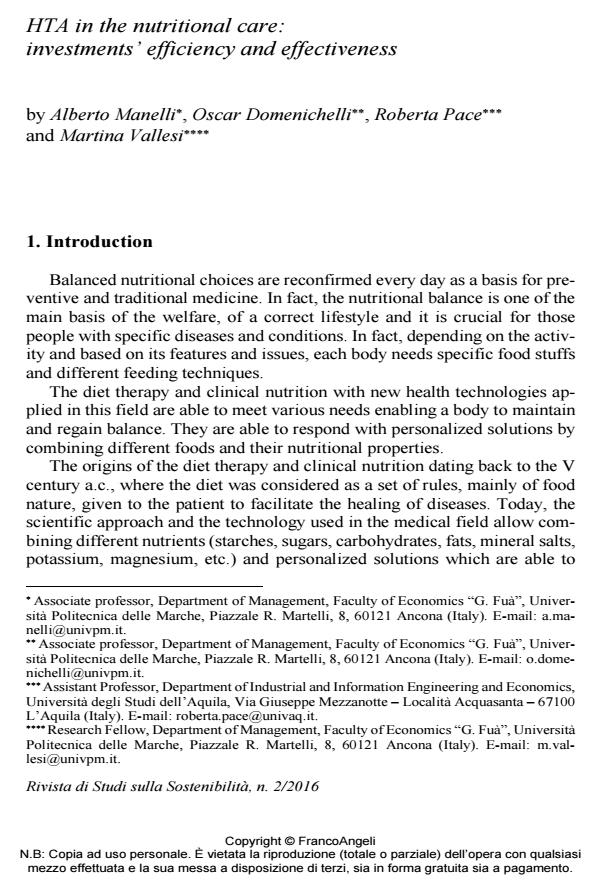HTA in the nutritional care: investments’ efficiency and effectiveness
Titolo Rivista RIVISTA DI STUDI SULLA SOSTENIBILITA'
Autori/Curatori Alberto Manelli, Oscar Domenichelli, Roberta Pace, Martina Vallesi
Anno di pubblicazione 2017 Fascicolo 2016/2
Lingua Inglese Numero pagine 12 P. 57-68 Dimensione file 159 KB
DOI 10.3280/RISS2016-002006
Il DOI è il codice a barre della proprietà intellettuale: per saperne di più
clicca qui
Qui sotto puoi vedere in anteprima la prima pagina di questo articolo.
Se questo articolo ti interessa, lo puoi acquistare (e scaricare in formato pdf) seguendo le facili indicazioni per acquistare il download credit. Acquista Download Credits per scaricare questo Articolo in formato PDF

FrancoAngeli è membro della Publishers International Linking Association, Inc (PILA), associazione indipendente e non profit per facilitare (attraverso i servizi tecnologici implementati da CrossRef.org) l’accesso degli studiosi ai contenuti digitali nelle pubblicazioni professionali e scientifiche.
Health Technology Assessment (HTA) in spite of being a relatively recent methodological phenomenon has become increasingly important tool for the policy makers to bridge the gap between research and policy making. This work starts with an evaluation of the logic behind the adoption of HTA process for policy making, including features and advantages of the process. Subsequently, this study presents the risk related to the investments in health sector, from the different prospectives such as: balance among effectiveness, efficiency and economy; and role of the scarcity of available resources. Finally, the explanation about the necessity to evaluate the ability of investments in the health technology in nutritional care making a synthesis between the different variables to support the operations of the policy makers in a view to create added value and to contain costs.
La valutazione delle tecnologie sanitarie pur rappresentando un fenomeno metodologico relativamente recente, ha acquisito una crescente importanza, come ponte tra ricerca e policy making. Il presente lavoro prende avvio proprio dall’esposizione della logica sottostante l’adozione di un processo di HTA, al fine di evidenziarne caratteristiche e vantaggi. Successivamente l’attenzione è concentrata sul rischio degli investimenti in sanità, declinato nelle sue determinanti: l’equilibrio tra efficacia, efficienza ed economicità; la scarsità di risorse disponibili. Infine, la spiegazione della necessità di valutare degli investimenti in tecnologia sanitaria per le cure nutrizionali effettuando una sintesi tra variabili di natura diversa in una prospettiva di creazione di valore e contenimento dei costi per supportare l’operatività del policy maker.
Parole chiave:Tecnologie sanitarie, nutrizione, valutazione, efficienza, efficacia, valore.
Alberto Manelli, Oscar Domenichelli, Roberta Pace, Martina Vallesi, HTA in the nutritional care: investments’ efficiency and effectiveness in "RIVISTA DI STUDI SULLA SOSTENIBILITA'" 2/2016, pp 57-68, DOI: 10.3280/RISS2016-002006